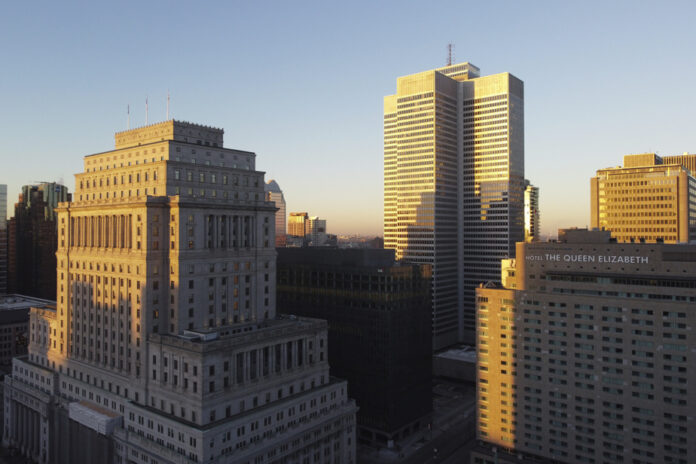Despite the lifting of the health emergency for a year, the return of workers to the city center remains timid. The Chamber of Commerce of Metropolitan Montreal, at the heart of the revival of the business district, is stepping up its efforts. It remains to be seen whether the recent decision by the Royal Bank to require the presence of its workers in the office will set a precedent.
“Beginning May 1, RBC employees in hybrid roles will meet face-to-face most of the time, with the option to work remotely one or two days a week, depending on their team,” Jessica said in an email. Assaf, head of communications for RBC in Quebec.
The long-term competitiveness of the institution would be at stake, according to an internal memo, the main points of which were reported in the Globe and Mail.
“Employers are experiencing a drop in productivity from their employees,” believes Michel Leblanc, President and CEO of the Chamber of Commerce of Metropolitan Montreal. Studies diverge on the subject, it is pointed out to him. “I have no doubts,” he replies. I have business people who call me and all say, “Michel, I have productivity issues related to teamwork, staff retention and onboarding new employees.” »
According to the latest figures available, almost 8 out of 10 workers returned to work in the city center at least one day a week. But the intensity of the presence poses a problem.
The solution, he says, lies in the simultaneous commitment of major employers to work in the office. “Companies need to tell their employees that the normal place to work is the office,” he says. Having said that, there are possible flexibility arrangements depending on functions and jobs. »
In the meantime, the Chamber has just issued a new call for projects to convince workers to return to the city center. The owner of office towers Ivanhoé Cambridge has set up directly on the Place Ville Marie esplanade what it calls Common Area, i.e. two shared work spaces. These heated spaces are offered to everyone, free of charge, upon reservation.
The initiative is part of the Ré·Création MTL program, funded in part by the Ministry of Economy, Innovation and Energy.
The hardware store BMR, a division of the Sollio cooperative, has just replenished its coffers. He obtained 46.6 million for the sale of two warehouses at 1501, rue Ampère in Boucherville and 2400, rue de la Métropole in Longueuil.
The acquirer is a numbered company whose president is Ron Lavy. The buyer also obtains a right of first refusal granted by Sollio on the property located at 2405, rue de la Province in Longueuil.
BMR had acquired the two warehouses simultaneously in May 2020.
The transactions were completed in early March.
“We sold our assets to free up capital to manage our growth,” said BMR spokesperson Kaven Delarosbil. We stay on site as a tenant. There is nothing that changes in our activities. »
BMR had sales of 1.57 billion in 2022, according to Sollio’s most recent annual report. The pre-tax surplus was 153.8 million.
If the retail division of the cooperative is doing well, the same cannot be said of the parent company, Sollio, which lost 331 million last year on sales of 8.9 billion. A recovery plan has been underway since last year, which involves asset sales.
The madness that has plagued industrial real estate for the past two years is coming to an end.
Helping construction and the apprehended economic slowdown would help rebalance the market, according to two market specialists from Laval and the North Shore.
The vacancy rate for industrial premises remains low for the moment, at 1.3%, in the Montreal area. In Laval, the rate is 1.5% and in the North Crown, 1.1%.
A market is considered to be in equilibrium, i.e. it does not favor either the landlord or the tenant, at a rate of 5%, according to experts from the CBRE agency who gave an overview of the market on March 30 last.
The scarcity of premises has caused a strong inflation in rents. In fact, since the start of the pandemic, Montreal is the market that has experienced the second largest increase in industrial rents in North America, pointed out James Cacchione, senior vice-president at CBRE.
According to Mr. Cacchione, rents started to rise when the vacancy rate dipped below 3%. And prices soared when vacancy fell below 2%.
However, this rate will rise in 2023 to the point where the price of rents will begin to stabilize, predicts his colleague Geoffrey Hughes, associate vice-president. At the same time, the sale price of industrial buildings will experience the same fate.
Several factors will help rebalance the market, Hughes explained. Many new premises will be delivered by the first quarter of 2024, adding nearly two million square feet to the Laval and North Shore market.
Rising interest rates will calm the investment market. For landlords, the increases in municipal taxes, which are passed on to rents, will put downward pressure on the net asking price. The ability of small business tenants to pay has a limit, after all.















